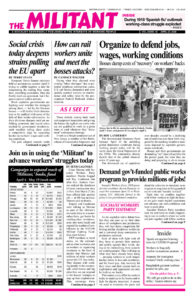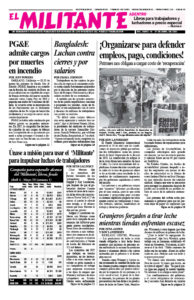European Union finance ministers held an acrimonious summit April 9, trying to cobble together a deal for resurrecting the trading bloc members’ crumbling economies. They did finally reach an agreement, but it began to unravel within minutes.
Rival capitalist governments are fighting over whether the strongest among them — led by the German bosses — will further their domination or be saddled with some of the debt of their weaker adversaries. As their divisions sharpen amid an unfolding economic and social crisis marked by government shutdowns, each member ruling class seeks a competitive edge by squeezing harder on workers’ wages and working conditions.
The pact adopted extends credit and provides for some unemployment insurance, but does nothing to meet the urgent need for jobs for the millions of workers who have been thrown out of work. In Spain alone over 900,000 workers were tossed aside in the last two weeks of March. Many workers and farmers face a serious crisis.
“We are OK at the moment,” house cleaner Maritza Lopez told the Independent in Barcelona. “But I have a friend with a child who does occasional cleaning work and she is in a desperate situation.”
The finance ministers agreed to make half-a-trillion worth of euros available in credit but could not agree on who or how to pay for the loans.
Nine governments saddled by relatively higher debts and steeper borrowing costs — led by Madrid, Paris and Rome — pushed for the EU to issue “coronabonds” to finance the aid package. They hope that by “mutualizing” the debt they will push the cost onto Germany and the other ruling classes with relatively stronger capitalist economies.
When such a method of financing EU credit was proposed in 2012, German Chancellor Angela Merkel responded by saying no such thing would happen “as long as I live.” Merkel made a bloc with the governments of Holland and Austria to prevent the proposal from being adopted April 9.
The split is along the same lines that have marked the unraveling of the EU for years. It’s been exacerbated by the British rulers pulling out. They had been the bloc’s second largest contributor.
Rome has gone from one of the wealthier founding members of what became the EU to one facing crushing debts and demanding aid. “Lack of European solidarity is putting the European Union in mortal danger,” former European Commission President Jacques Delors bemoaned.
Berlin, Paris block medical supplies
In reality the EU was doomed from the start. Cutthroat national interests mark all relations between capitalist powers, in Europe and elsewhere. Just one example was the initial response of the French and German rulers to calls for help from Rome and other countries being devastated by depression conditions triggered by the spread of coronavirus. Paris and Berlin blocked the export of medical equipment to their “allies,” including in Italy.
Berlin and the other ruling classes were quick to impose tight travel restrictions, discarding the EU’s open borders policy.
From its founding the EU was a protectionist trading bloc established to counter the clout of the world’s dominant imperialist power in Washington, with some dreaming it would one day become a new all-Europe state. It was supposed to be a model for a globalized world in which the economies of different countries are increasingly integrated and national conflicts and the threat of inter-imperialist war fade away. But under capitalism the rulers are driven by the very workings of their capitalist system to engage in fierce competition for markets and resources or go under.
The attempt to impose this “union” sharpened antagonisms among the rival European ruling classes — and brought ruin on working people, especially in countries with more vulnerable capitalist economies across southern Europe. Following the 2008 financial crash successive Greek governments capitulated to demands by EU officials — speaking for the German and, to a lesser degree, French rulers — that they slash workers’ living standards in exchange for receiving any bailouts.
Like other governments, Madrid and Rome gave up their own currencies when they signed onto the euro in 1999, and are unable to defer the crisis or ease its impact on the rulers by devaluing their currency. The euro has simply served as a tool for Berlin to tighten its grip over its rivals.
The Italian government was denounced for signing the April 9 EU proposals by opposition parties there angry that accepting the loans involved accepting demeaning terms dictated by EU bureaucrats, as the Greek government was forced to do following the 2008 financial collapse.
And, as happened in Greece, the results will fall hardest on working people.
As workers and farmers in Italy watch this spectacle unfold, millions are forced to fend for themselves in the face of a spreading social crisis and they are outraged. Polls show 88% of Italians say the EU isn’t helping their efforts to face the deadly disease and economic disaster, and 67% say Italy’s membership in the EU is the problem.

